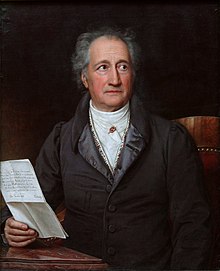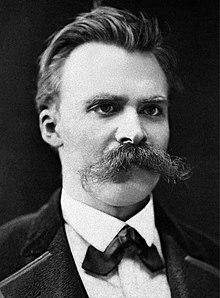
19th-century German non-fiction writers
4 episodes
Episodes in this category also belong to the following categories:
Goethe
Melvyn Bragg discusses the great German polymath Johann Wolfgang Goethe - novelist, dramatist, poet, humanist, scientist and philosopher.
6 April 2006
Featuring: Tim Blanning, Sarah Colvin, W. Daniel Wilson
Philosophers of linguisticsGerman philosophers of artRomantic poetsGerman philosophers of scienceGerman political philosophersJohann Wolfgang von Goethe, Sturm und Drang18th-century German civil servants, 18th-century German dramatists and playwrights, 18th-century German historians, 18th-century German novelists, 18th-century German poets, 18th-century travel writers, 19th-century German civil servants, 19th-century German diplomats, 19th-century German dramatists and playwrights, 19th-century German poets, German bibliophiles, German diplomats, German male novelists, People from Weimar, Scientists from Weimar, Writers from Frankfurt, Writers from WeimarLiteracy and society theoristsPhilosophers of social science19th-century German philosophersTheorists on Western civilizationGerman travel writersPhilosophers of literaturePhilosophers of sexualityEpic poets19th-century German novelistsPhilosophy writersLeipzig University alumni18th-century German male writersEpigrammatists18th-century German philosophers, 18th-century essayists19th-century travel writers19th-century German male writersUniversity of Strasbourg alumniGerman philosophers of languageMembers of the Göttingen Academy of Sciences and HumanitiesLiterary theoristsMembers of the Bavarian Academy of SciencesFabulistsGerman untitled nobilityGerman philosophers of culture19th-century German essayistsGerman male essayists18th-century German educators, 18th-century historians, 19th-century German educators, 19th-century historiansGerman autobiographersGerman ethicists, German philosophers of educationNatural philosophersGerman male dramatists and playwrights, German male poetsPantheistsFreethought writersEnlightenment philosophersGerman librariansWriters about activism and social changeColor scientistsGerman Freemasons19th-century German historians19th-century German non-fiction writersGerman philosophers of historyGerman male non-fiction writersGoethe and the Science of the Enlightenment
Melvyn Bragg assesses the scientific legacy of the 18th century German poet and thinker Goethe, who gave us the term morphology and is sometimes even credited with inventing biology itself.
10 February 2000
Featuring: Nicholas Boyle, Simon Schaffer
SciencePhilosophers of linguisticsGerman philosophers of artRomantic poetsGerman philosophers of scienceGerman political philosophersJohann Wolfgang von Goethe, Sturm und Drang18th-century German civil servants, 18th-century German dramatists and playwrights, 18th-century German historians, 18th-century German novelists, 18th-century German poets, 18th-century travel writers, 19th-century German civil servants, 19th-century German diplomats, 19th-century German dramatists and playwrights, 19th-century German poets, German bibliophiles, German diplomats, German male novelists, People from Weimar, Scientists from Weimar, Writers from Frankfurt, Writers from WeimarLiteracy and society theoristsPhilosophers of social science19th-century German philosophersTheorists on Western civilizationGerman travel writersPhilosophers of literaturePhilosophers of sexualityEpic poets19th-century German novelistsPhilosophy writersLeipzig University alumni18th-century German male writersEpigrammatists18th-century German philosophers, 18th-century essayists19th-century travel writers19th-century German male writersUniversity of Strasbourg alumniGerman philosophers of languageMembers of the Göttingen Academy of Sciences and HumanitiesLiterary theoristsMembers of the Bavarian Academy of SciencesFabulistsGerman untitled nobilityGerman philosophers of culture19th-century German essayistsGerman male essayists18th-century German educators, 18th-century historians, 19th-century German educators, 19th-century historiansGerman autobiographersGerman ethicists, German philosophers of educationNatural philosophersGerman male dramatists and playwrights, German male poetsPantheistsFreethought writersEnlightenment philosophersGerman librariansWriters about activism and social changeColor scientistsGerman Freemasons19th-century German historians19th-century German non-fiction writersGerman philosophers of historyGerman male non-fiction writersKant's Copernican Revolution
Melvyn Bragg and guests discuss Kant's ideas on how the world depends on us, on the limits of human knowledge and why we are bound to ask questions we cannot answer.
3 June 2021
Featuring: Fiona Hughes, Anil Gomes, John Callanan
PhilosophyGerman philosophers of artNatural law ethicistsGerman philosophers of scienceGerman political philosophersMetaphilosophersPhilosophers of social sciencePhilosophers of warGerman Lutherans18th-century philosophersTheoretical historiansGerman nationalists19th-century German philosophersTheorists on Western civilizationPhilosophers of literatureGerman idealistsAge of EnlightenmentPhilosophers of logicLogiciansPhilosophers of lawPhilosophers of sexuality18th-century German writersPhilosophy writersRationalists18th-century German male writersKantianismGerman philosophers of mind, German philosophers of religionWriters about religion and science18th-century German philosophers, 18th-century essayists19th-century German male writers19th-century Prussian peopleHumor researchersGerman philosophers of culture19th-century German essayistsPeople of the Age of EnlightenmentGerman agnosticsGerman male essayistsOntologistsGerman ethicists, German philosophers of educationLecturersMembers of the Prussian Academy of SciencesIdealistsNatural philosophersEnlightenment philosophersGerman epistemologistsWriters about activism and social change19th-century German non-fiction writersGerman philosophers of historyGerman male non-fiction writersGerman logicians, Kantian philosophersNietzsche's Genealogy of Morality
Melvyn Bragg and guests discuss Nietzsche's influential ideas about what it means to be moral.
12 January 2017
Featuring: Stephen Mulhall, Fiona Hughes, Keith Ansell-Pearson
PhilosophyGerman philosophers of artDeaths from pneumonia in GermanyPhilosophers of nihilismMetaphilosophersExistentialistsPhilosophers of social science19th-century German philosophersTheorists on Western civilizationStateless peoplePhilosophers of literatureDeterministsPhilosophers of sexualityCritics of work and the work ethic19th-century German novelistsPhilosophy writersCritical theoristsLeipzig University alumniGerman philosophers of mind, German philosophers of religionWriters about religion and science19th-century German male writersAphoristsIrony theorists19th-century Prussian peopleUniversity of Bonn alumni19th-century German journalistsPhilosophers of psychologyGerman critics of ChristianityCritics of the Catholic Church19th-century German male musiciansAnti-consumeristsGerman philosophers of culturePhilosophers of timeCritics of religionsGerman male essayistsPeople associated with the University of BaselOntologistsMetaphysiciansGerman ethicists, German philosophers of educationAnti-nationalistsGerman epistemologistsPeople from the Province of SaxonyWriters about activism and social changeGerman military personnel of the Franco-Prussian War19th-century German non-fiction writersGerman philosophers of historyGerman male non-fiction writersGerman music critics


